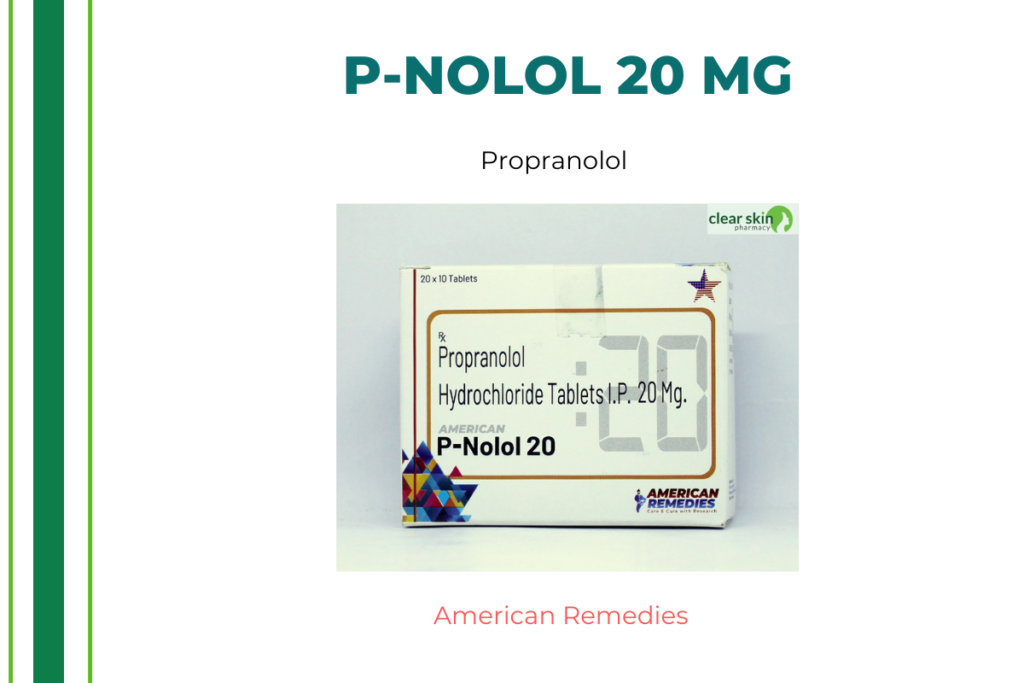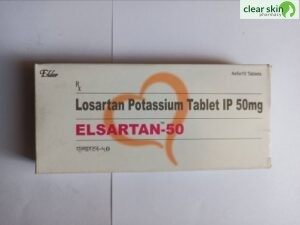P-Nolol 20
P-Nolol 20 is a beta-blocker used alone or in combination with other drugs to treat high blood pressure (hypertension), heart-related chest pain (angina), heart rhythm disorder (arrhythmia), migraine headache, and tremor symptoms (fits). It influences the heart and circulatory system, namely the regulation of blood flow through arteries and veins. High blood pressure increases the workload of the heart and arteries. If this persists for a long time, the heart and arteries may not function properly. As a result of this damage to the brain, heart, and kidney blood vessels, a stroke, heart failure, or kidney failure may ensue. Blood pressure reduction can aid in the prevention of strokes and heart attacks.
By inhibiting the operation of some naturally occurring substances in the body, P-Nolol 20 relaxes our blood vessels. This reduces your blood pressure and your future risk of suffering a stroke, heart attack, or other heart or kidney issues. To be successful, this medication must be used consistently.
P-Nolol 20 may be taken orally with or without food, or as directed by your physician. With a glass of water, completely swallow the tablet. It should not be broken, crushed, or chewed. P-Nolol 20 should be taken daily at the same time for optimal results. P-Nolol 20 is generally regarded as safe for human consumption. You may have common side effects like dizziness or fatigue, chilly hands or feet, difficulty sleeping, and nightmares. Typically, these side effects are minimal and temporary. However, if the side effects persist, consult your physician.
Do not stop taking P-Nolol 20 without visiting your physician first. Withdrawal from P-Nolol 20 may cause alterations in heart rhythm and blood pressure, as well as chest pain or a heart attack. To prevent these side effects, your doctor will reduce your dosage gradually over time. You should not take P-Nolol 20 if you have a very slow heart rate, asthma, a serious heart condition (sick sinus syndrome), or a heart obstruction. P-Nolol 20 should not be administered to children weighing less than 4.5 pounds. It should not be administered to children younger than 12 years old. Before taking P-Nolol 20, inform your doctor if you have muscle disorders (myasthenia gravis, rhabdomyolysis), breathing problems (COPD, bronchitis, emphysema), low blood sugar (hypoglycemia), low blood pressure (hypotension), depression, previous heart failure, liver/kidney disease, thyroid hormone disorder, adrenal gland cancer, or circulation problems (Raynaud’s syndrome).
High blood pressure (hypertension), chest pain (angina), irregular cardiac rhythm, prevention of heart attacks, migraines, and anxiety

Medicinal Advantages
P-Nolol 20 inhibits both beta 1 and beta 2 receptors in order to function. P-Nolol 20 inhibits the beta 1 receptor, which lowers blood pressure by slowing the heart rate and decreasing the frequency with which the heart pumps blood. In contrast, P-Nolol 20 narrows blood channels in skeletal muscle by inhibiting beta 2 receptors in the lungs. This reduces your overall blood pressure and reduces your chances of future stroke, heart attack, heart disease, and renal disease. P-Nolol 20 also alleviates the symptoms of angina (chest pain related to the heart) and may improve an individual’s ability to exercise while experiencing angina. P-Nolol 20 is combined with thiazide diuretics and other drugs for the treatment of high blood pressure. P-Nolol 20 also prevents migraines and reduces essential tremor symptoms (fits). P-Nolol 20 can be used with other thyroid medications to treat an overactive thyroid by reducing the symptoms of too much thyroid hormone (thyrotoxicosis).
Use Instructions
P-Nolol 20 may be taken orally with or without food, or as directed by your physician. With approximately a glass of water, completely swallow the tablet. It should not be broken, crushed, or chewed. For optimal results, take the drug at the same time daily. Do not double the dose to compensate for a missing dose.
Place in a cool, dry area out of direct sunlight.
P-Nolol 20 Side Effects
Every medication has undesirable side effects. You may experience some minor and temporary side effects after using P-Nolol 20. The most common adverse effects of P-Nolol 20 are vertigo, fatigue, cold hands and feet, constipation, difficulty sleeping, and nightmares. However, if the side effects persist, consult your physician.
Drug Recommendations
Cardiogenic shock (the inability of the heart to adequately pump blood) and heart failure should not be treated with P-Nolol 20. Do not discontinue P-nolol 20 without visiting your doctor first. Withdrawal from propranolol may cause alterations in heart rhythm and blood pressure, as well as chest pain or a heart attack. To prevent these side effects, your doctor will reduce your dosage gradually over time. You should not take Propranolol if you have a very slow heartbeat, asthma, a serious heart condition (sick sinus syndrome), or a heart obstruction. Propranolol should not be administered to children weighing less than 4.5 pounds. It should not be administered to children younger than 12 years old. Before taking Propranolol, inform your doctor if you have muscle disorders (myasthenia gravis, rhabdomyolysis), breathing problems (COPD, bronchitis, emphysema), low blood sugar (hypoglycemia), low blood pressure (hypotension), depression, previous heart failure, liver/kidney disease, thyroid hormone disorder, adrenal gland cancer, or circulation issues (Raynaud’s syndrome). You should not discontinue Propranolol before undergoing surgery. It is possible to mask diabetes signs with propranolol. Inform your doctor if you have diabetes type 1 or type 2. Additionally, it may exacerbate your congestive heart failure and bradycardia symptoms (slow heart rate less than 60). If you are using Propranolol with anticoagulants such as warfarin, you should frequently monitor your prothrombin time.
Interactions Between Drugs
Other beta-blockers (acebutolol, atenolol, bisoprolol, carteolol, esmolol, metoprolol, nadolol, nebivolol, or sotalol) may interact with propranolol, resulting in a dangerously low heart rate. Propranolol should not be used with other blood pressure medications (lisinopril, enalapril, diltiazem, prazosin, terazosin, doxazosin), asthma treatments (theophylline), or painkillers. Before taking Propranolol, you should inform your doctor if you are taking any of the following drugs:
Propranolol has a significant interaction with grapefruit and protein-rich meals. Propranolol may be less effective when combined with ayurvedic, homeopathic, unani, herbal, or over-the-counter medicines. Therefore, it is best to wait at least 2 hours before using these products after taking Propranolol.
Propranolol is contraindicated for those with diabetes, thyroid illness, asthma, cardiogenic shock (when the heart fails to pump enough blood to the body), heart valve difficulties (stenosis), low blood pressure (hypotension), coronary heart disease, liver disease, or heart failure.
Safety Suggestions
ALCOHOL
To avoid the unpleasant side effects of low blood pressure causing dizziness or sleepiness while taking Propranolol, you should not consume alcohol.
PREGNANCY
Unless prescribed by a physician, propranolol is not recommended during pregnancy. Before prescribing it to you, your physician will weigh the benefits and potential risks.
BREAST FEEDING
Small amounts of propranolol are present in breast milk. However, this is inadequate to cause your infant any issues. However, before to breastfeeding your child, you should contact with your physician.
DRIVING
PROPRANOLOL HAS NO EFFECT ON YOUR ABILITY TO DRIVE OR OPERATE MACHINERY. Propranolol has no impact on your ability to drive or operate machinery. Some individuals using Propranolol may feel dizziness or tiredness. If this occurs, you should seek medical attention.
LIVER
If you have a history of liver disease or disorder, you should use Propranolol with caution. Your physician may need to adjust your dosage.
KIDNEY
Propranolol should be used with caution, particularly in patients with a history of kidney disease. Your physician may need to adjust your dosage.
No habit formation
Advice on Diet and Lifestyle
Maintain a healthy weight between 19.5-24.9 BMI.
Perform at least 150 minutes of regular physical activity or exercise every week, or around 30 minutes daily. This can help you reduce your high blood pressure by around 5 mm Hg.
For a nutritious diet, whole grains, fruits, vegetables, and low-fat dairy products are all excellent options.
Optimal sodium chloride (table salt) intake for most persons is 2300 mg per day or less than 1500 mg per day.
Limit your alcohol consumption to one serving for women and two serves for men.
Stopping smoking is the best method to minimize your risk of heart disease.
Chronic stress may induce an increase in blood pressure. Spending time with and appreciating your loved ones is a stress-reduction and mindfulness approach.
Monitor your blood pressure daily and contact your physician if it swings excessively.
Include omega 3 fatty acid-rich foods and beverages in your diet on a daily basis. Olive oil, soybean oil, canola oil, and coconut oil are some of the low-fat cooking oils that can help reduce blood pressure.
Recommendations
This product may make it more difficult to regulate blood sugar levels. Check your blood sugar as directed and report the results to your doctor.
Immediately consult a physician if you experience shortness of breath with a cough that worsens when you move (such as while climbing stairs), swollen ankles or legs, chest pain, or an irregular heartbeat.
Additional Information: This item is non-refundable.
Concerns of Patients
Blood pressure measures the force with which our heart pumps blood to all regions of the body. Hypertension is a chronic illness characterized by an abnormally high cardiac workload and blood pressure. This disorder can cause calcified arteries (blood vessels), which restricts blood and oxygen flow to the heart. Angina (chest pain) and heart attack can both be brought on by hypertension (when blood supply to the heart is blocked). High blood pressure may result in brain injury (stroke) and renal failure. One can identify elevated blood pressure with a blood pressure monitor or sphygmomanometer. Systolic pressure is the force exerted as the heart pumps blood out. In contrast, diastolic pressure is the pressure in your heart when it is at rest between heartbeats. If your blood pressure is 140/90 mm Hg, the systolic pressure is 140 mm Hg and the diastolic pressure is 90 mm Hg. The optimal range for blood pressure is between 90/60 mm Hg and 120/80 mm Hg.
FAQs
It is advised that you continue to take your medication even after your blood pressure has stabilized or returned to normal, because a blood pressure spike can occur at any time. If you are experiencing any discomfort, contact your doctor immediately.
Propranolol is often provided over the course of weeks to months to treat cardiovascular diseases and disorders. However, long-term use without a doctor’s approval can be fatal. Therefore, take it for as long as your doctor recommends.
If you are using a beta-blocker, your physician may advise you to avoid bananas and other foods high in potassium, such as papaya, tomato, avocado, and kale.
If you forget to take Propranolol during the day, take it as soon as you remember, then return to your regular routine. Do not take a double dose in order to make up for a missing dose.
When taken with general anesthesia before surgery, propranolol decreases blood pressure; consequently, your doctor may advise you to discontinue use. Inform your physician of all prescription and over-the-counter medications you are using.
There are no definitive clinical studies demonstrating that Propranolol causes weight gain. However, it can affect how your body uses energy and cause exhaustion. Consult your physician if you are concerned about your weight gain.
Propranolol and alcoholic beverages should be avoided or consumed with caution since they can lower blood pressure and produce dizziness or drowsiness.






Be the first to review “P-NOLOL 20 MG 10 Tablets”